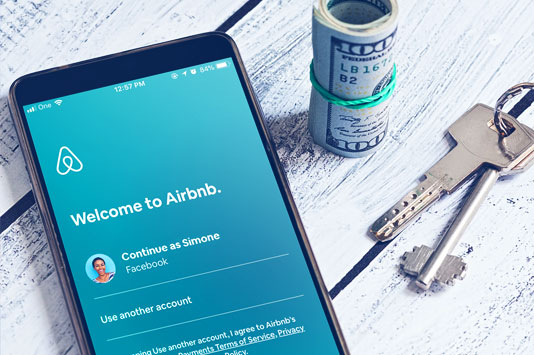
The sharing economy is the practice of underused assets, such as a vacant home, being shared as a service. The gig economy is similar but with more of a focus on connecting freelancers to those who need support. These trends are driven by millennials – typically defined as those born between 1981 and 1996 – and an increasing trend towards minimalism.
The best known global examples of sharing and gig economy businesses are carsharing apps Uber and Lyft; office sharing business, WeWork; and vacation rental companies, Airbnb and HomeAway. In Bermuda, people have been sharing their homes with tourists for years and we have a strong culture of informal gig work or freelancing without a formal application or business to manage this, since the closure of Jobber.bm.
However, we do have two popular global businesses which utilise the sharing and gig economies: Hitch and Airbnb. Hitch is a cell phone app, connecting the public directly with a taxi driver, cutting out the middleman, and providing arrival and cost estimates. However, this app differs from Uber and Lyft in that it is available only to existing taxi drivers.
Airbnb is a global company and phenomenon that enables people to rent out their homes or spare rooms to visitors. The enterprise has attracted a lot of interest in Bermuda recently with the company signing an agreement with Bermuda Tourism Authority in 2017. There are also local companies, such as Bermuda Rentals and White Roof B&B, which fill a similar role.
The Government recently passed the Vacation Rentals Act 2018, which will levy a 4.5 per cent tax on vacation rentals. Companies that collect rent for rental properties, such as Airbnb or Bermuda Rentals will be responsible for paying this tax to the Bermuda Tourism Authority. Owners of property that is directly rented out to visitors without the use of a third party will be responsible for collecting the tax from the tourists and pay it directly to the Bermuda Tourism Authority themselves.
Vacation rentals are often touted as an effortless way to make some money on the side if you have a spare room or property that will be vacant. But it is important to recognise that there are more costs and complications than initially meet the eye. Firstly, the space offered on a vacation rental platform must be accurately represented – unfortunately, the Rent Commissioner’s office has received complaints about this. Not only can a misleading listing leave a homeowner open to a lawsuit, but also this can have a negative cumulative effect on Bermuda’s reputation as a tourist destination.
When renting out your space on a platform such as Airbnb, it is crucial to ensure that you are fully covered by insurance, to protect against any damage or injury to your property or guests. Many vacation rental sites similar to Airbnb do offer some insurance options, including Host Protection Insurance (in case a guest gets hurt while staying at your property), but you should always be careful to read the terms and conditions to ensure that you know specifically what is covered.
As well as using insurance coverage provided by a vacation rental platform, it is important that you know your coverage and to check that your insurance policy with your provider is up to date and fully protects you. Most regular home insurance has an exclusion for operating a business from home. Whilst renting a home out on a month to month basis is not considered a business, vacation rentals are a grey area.
If you decide to go down this route, you will need to do one of the following, depending on how your rental unit is governed by law - i.e. if your rental unit has an Annual Rental Value of $22,800 or less you must apply for a Vacation Rental Certificate from the Rent Commissioner’s office, otherwise it falls under the purview of the Ministry of Economic Development and Tourism. Both types of application forms can be downloaded or filled out online from the Ministry of Economic Development and Tourism on the gov. portal.
Registering and paying the 4.5 per cent fee on all new bookings made as of September 1, 2018 is required by law and failure to do so will result in legal action by the Bermuda Tourism Authority. Once your property is registered, you should contact us to notify us about your plans and your policy can be endorsed for vacation rental use. If you fail to register your property with the government or notify your insurance provider, this may impact the success of a claim. By working with us, one of our insurance specialists can help guide you through the process of protecting you and your property.
While there is an enormous potential for earning with the gig and sharing economy, it is important to do your research. There is still room for development of gig and sharing economy and applications in Bermuda: elsewhere there are companies that enable customers to have food from their favourite restaurants delivered or to list odd jobs that need doing, from assembling flatpack furniture to mounting televisions. It is only a matter of time until more creative sharing solutions are rolled out in Bermuda and Argus is committed to providing flexible and innovative insurance solutions for its customers to meet consumer demand.
Available resources
Visit the following resources to find out more information about renting out your home:
- Vacation rentals Fact Sheet
- Consumer Affairs Bermuda Website







